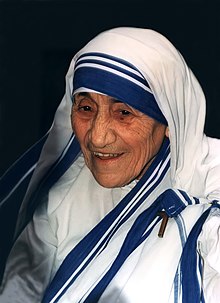
Back Moeder Teresa Afrikaans Mutter Teresa ALS እምዬ ቴሬሳ Amharic Santa Teresa de Calcuta AN الأم تريزا Arabic الام تيريزا ARZ মাদাৰ টেৰেছা Assamese Teresa de Calcuta AST Tayka Teresa Aymara Tereza Ana Azerbaijani
Teresa of Calcutta | |
|---|---|
 Mother Teresa in 1995 | |
| Virgin | |
| Born | Anjezë Gonxhe Bojaxhiu 26 August 1910 Üsküp, Kosovo vilayet, Ottoman Empire |
| Died | 5 September 1997 (aged 87) Calcutta, West Bengal, India |
| Venerated in | Catholic Church Anglican Communion |
| Beatified | 19 October 2003, Saint Peter's Square, Vatican City by Pope John Paul II |
| Canonized | 4 September 2016, Saint Peter's Square, Vatican City by Pope Francis |
| Major shrine | Mother House of the Missionaries of Charity, Calcutta, West Bengal, India |
| Feast | 5 September[1] |
| Attributes | Religious habit Rosary |
| Patronage | |
| Title | Superior general |
| Personal | |
| Religion | Catholicism |
| Nationality |
|
| Denomination | Catholic |
| Signature | |
| Organization | |
| Institute |
|
| Senior posting | |
| Period in office | 1950–1997 |
| Successor | Sr. Nirmala Joshi, MC |
Mary Teresa Bojaxhiu MC (born Anjezë Gonxhe Bojaxhiu, Albanian: [aˈɲɛzə ˈɡɔndʒɛ bɔjaˈdʒi.u]; 26 August 1910 – 5 September 1997), better known as Mother Teresa or Saint Mother Teresa,[a] was an Albanian-Indian Catholic nun, founder of the Missionaries of Charity and is a Catholic saint.[6][7][8] Born in Skopje, then part of the Ottoman Empire,[b] she was raised in a devoutly Catholic family. At the age of 18, she moved to Ireland to join the Sisters of Loreto and later to India, where she lived most of her life and carried out her missionary work. On 4 September 2016, she was canonised by the Catholic Church as Saint Teresa of Calcutta. The anniversary of her death, 5 September, is now observed as her feast day.
Mother Teresa founded the Missionaries of Charity, a religious congregation that was initially dedicated to serving "the poorest of the poor" in the slums of Calcutta. Over the decades, the congregation grew to operate in over 133 countries, as of 2012[update],[9] with more than 4,500 nuns managing homes for those dying from HIV/AIDS, leprosy, and tuberculosis, as well as running soup kitchens, dispensaries, mobile clinics, orphanages, and schools. Members of the order take vows of chastity, poverty, and obedience and also profess a fourth vow: to give "wholehearted free service to the poorest of the poor."[10]
Mother Teresa received several honours, including the 1962 Ramon Magsaysay Peace Prize and the 1979 Nobel Peace Prize. Her life and work have inspired books, documentaries, and films. Her authorized biography, written by Navin Chawla, was published in 1992, and on 6 September 2017, she was named a co-patron of the Roman Catholic Archdiocese of Calcutta alongside St Francis Xavier. However, she was also a controversial figure, drawing criticism for her staunch opposition to abortion, divorce and contraception, as well as the poor conditions and lack of medical care or pain relief in her houses for the dying.
- ^ "St. Teresa of Kolkata". Catholic News Agency. Archived from the original on 8 October 2018. Retrieved 6 September 2023.
- ^ Banerjee, Manik (6 September 2017). "Vatican declares Mother Teresa a patron saint of Calcutta". Associated Press. Archived from the original on 6 September 2017. Retrieved 6 September 2017.
- ^ "Mother Teresa to be named co-patron of Calcutta Archdiocese on first canonization anniversary". First Post. Indo-Asian News Service. 4 September 2017. Archived from the original on 26 April 2020. Retrieved 5 September 2017.
- ^ Cite error: The named reference
Cannon2013was invoked but never defined (see the help page). - ^ "Kur Nënë Tereza vinte në Tiranë/2" [When Mother Teresa came to Tirana/2]. Shqiptari i Italisë (in Albanian). 2 December 2010. Archived from the original on 18 September 2016. Retrieved 4 September 2016.
- ^ "Mother Teresa: The Miracles That Made Her a Saint". Biography. 14 October 2020. Retrieved 4 November 2024.
- ^ "Mother Teresa becomes a saint | September 4, 2016". HISTORY. Retrieved 4 November 2024.
- ^ Scott, David. The Love that Made Saint Teresa: Secret Visions, Dark Nights and the Path to Sainthood. United Kingdom: SPCK, 2016, p. 1.
- ^ Poplin, Mary (2011). Finding Calcutta: What Mother Teresa Taught Me About Meaningful Work and Service. InterVarsity Press. p. 112. ISBN 978-0-8308-6848-3. Archived from the original on 1 February 2022. Retrieved 3 October 2020.
- ^ Muggeridge (1971), chapter 3, "Mother Teresa Speaks", pp. 105, 113
Cite error: There are <ref group=lower-alpha> tags or {{efn}} templates on this page, but the references will not show without a {{reflist|group=lower-alpha}} template or {{notelist}} template (see the help page).